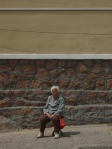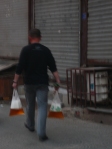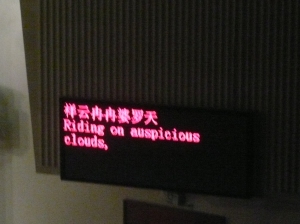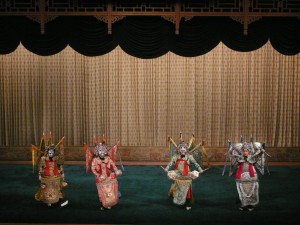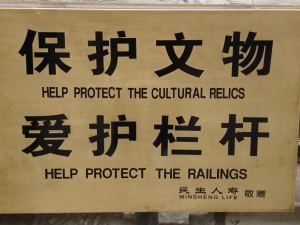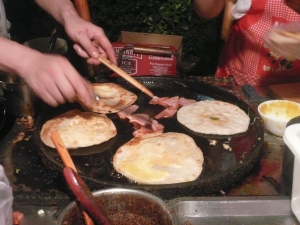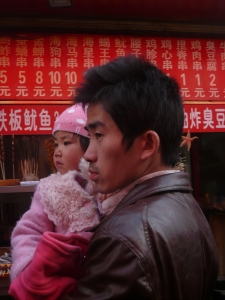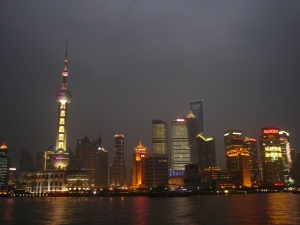Just over a week ago I was strolling along the wide Beijing streets in the sunshine; now this Scottish islander is back by the shores of the Atlantic. Already my time in China feels as if it happened in another lifetime – it’s amazing how easily you slip back into your old way of life (although sandwiches and clean tap water still seem slightly exciting, and I’ve been craving some good quality noodles for the past few days).
While my tales of Tianjin over the past ten months have touched on travel, teaching and trying to navigate daily life in the Middle Kingdom, there were always things I felt I should steer clear of. In fact, we were told frankly at the start of our year to avoid all mention of politics and religion, and never to talk about the “Three Ts”: Taiwan, Tibet and Tiananmen.
I covered the first one early on, in an accidentally amusing fashion. For a lesson on travel and holidays I had stuck a large world map on the board, in the hopes of making the lesson more colourful and interactive. My 17-year-old students seemed really interested in the map – I’d made the right choice. Then a Chinese whisper went round the 50-odd students, until one boy stuck his hand up and spoke into the silence: “Teacher, why is Taiwan a different colour from China?” Feigning ignorance, I left the classroom at the end of the lesson envisaging swift deportation. That did not happen, of course, but with student “monitors” in every class, there to help you as well as report on you, I was definitely a little nervous.
world map on the board, in the hopes of making the lesson more colourful and interactive. My 17-year-old students seemed really interested in the map – I’d made the right choice. Then a Chinese whisper went round the 50-odd students, until one boy stuck his hand up and spoke into the silence: “Teacher, why is Taiwan a different colour from China?” Feigning ignorance, I left the classroom at the end of the lesson envisaging swift deportation. That did not happen, of course, but with student “monitors” in every class, there to help you as well as report on you, I was definitely a little nervous.
The second topic was unavoidable in my second semester of teaching, as I was given a new class of Tibetan students, in their own classroom and own building, separate from their Han Chinese counterparts. Luckily nothing remotely controversial ever emerged; instead I listened to them as they spoke in their native tongue in between activities, and talked about how they all want to go back to Lhasa in their “future plans” conversations.
The third was never mentioned, unless in whispers between British friends. One might think that in an authoritarian country, politics pervades everything. In a way it does, but you could easily go through life in China unaware, or at least uninterested in, political happenings. For those without the magical VPN, internet news blackouts and problems with Google were frequent; the rest of us kept up with Chinese controversy over the Nobel Peace Prize, Ai Wei Wei’s detention and the Arab Spring through Western newspapers.
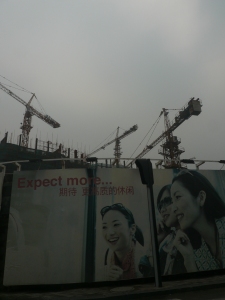 For a student of International Relations and a self-confessed news junkie, life in China was fascinating. Suddenly the things I’d been writing about as midnight approached in the university library were no longer theory but reality. The threat of (nuclear) conflict between North and South Korea seemed much more real last November, as I read about the shelling that was taking place no more than a few hundred miles from Tianjin’s port. China’s crackdown after the uprisings in the Middle East was even closer to home, the most visible example taking place on Wangfujing shopping street in Beijing, an area I’d frequented on weekends to the capital. And then of course, there was the inexorable, much commented on “rise of China” and its juggernaut economy. I’d read about it journals, textbooks and newspapers, but living in Tianjin you literally saw it happening. China is rising, in every sense of the word. Massive malls line the high streets in city centres; cranes cut the skyline at regular intervals, constructing the concrete symbols of China’s growth; the new middle classes display their wealth at every opportunity, in the form of designer handbags and flashy cars.
For a student of International Relations and a self-confessed news junkie, life in China was fascinating. Suddenly the things I’d been writing about as midnight approached in the university library were no longer theory but reality. The threat of (nuclear) conflict between North and South Korea seemed much more real last November, as I read about the shelling that was taking place no more than a few hundred miles from Tianjin’s port. China’s crackdown after the uprisings in the Middle East was even closer to home, the most visible example taking place on Wangfujing shopping street in Beijing, an area I’d frequented on weekends to the capital. And then of course, there was the inexorable, much commented on “rise of China” and its juggernaut economy. I’d read about it journals, textbooks and newspapers, but living in Tianjin you literally saw it happening. China is rising, in every sense of the word. Massive malls line the high streets in city centres; cranes cut the skyline at regular intervals, constructing the concrete symbols of China’s growth; the new middle classes display their wealth at every opportunity, in the form of designer handbags and flashy cars.
Despite the seemingly high-profile nature of politics in China, there is another reason it didn’t feature in my tales from Zhongguo: it simply wasn’t that large a part of my daily life. It was always hovering in the background, but encouraging shy students to speak, engaging the ones more interested in Chemistry homework than conversation, perfecting chopstick skills over a bowl of rice, practising Mandarin with the taxi driver as he swerved from one lane to the next – everyday activities were always higher up the agenda. Life takes over, as it does wherever you are in the world.
it didn’t feature in my tales from Zhongguo: it simply wasn’t that large a part of my daily life. It was always hovering in the background, but encouraging shy students to speak, engaging the ones more interested in Chemistry homework than conversation, perfecting chopstick skills over a bowl of rice, practising Mandarin with the taxi driver as he swerved from one lane to the next – everyday activities were always higher up the agenda. Life takes over, as it does wherever you are in the world.
The last year has been an extraordinary experience on every level, and I expect I will always feel some connection to this country of contrasts. While I can’t rule out any future Asian adventures, for Tianjin Tales, it is the end of a digital road.





